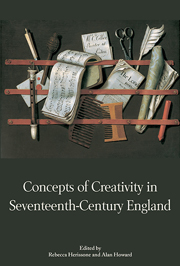Book contents
- Frontmatter
- Contents
- List of Illustrations
- List of Contributors
- Preface
- Introduction
- Creating to Order: Patronage and the Creative Act
- 1 ‘Big with New Events and some Unheard Success’: Absolutism and Creativity at the Restoration Court
- 2 Creativity on Several Occasions
- Creative Identity and the Role of Print Media
- Mapping Knowledge: The Visual Representation of Ideas
- Authorial Identity
- Imitation and Arrangement
- The Performer as Creator
- Bibliography
- Index
1 - ‘Big with New Events and some Unheard Success’: Absolutism and Creativity at the Restoration Court
from Creating to Order: Patronage and the Creative Act
Published online by Cambridge University Press: 05 March 2014
- Frontmatter
- Contents
- List of Illustrations
- List of Contributors
- Preface
- Introduction
- Creating to Order: Patronage and the Creative Act
- 1 ‘Big with New Events and some Unheard Success’: Absolutism and Creativity at the Restoration Court
- 2 Creativity on Several Occasions
- Creative Identity and the Role of Print Media
- Mapping Knowledge: The Visual Representation of Ideas
- Authorial Identity
- Imitation and Arrangement
- The Performer as Creator
- Bibliography
- Index
Summary
The slow but persistent emergence of a ‘cultural turn’ in early modern British historiography over the past several decades has opened up new opportunities for exploration of the political landscape from the perspective of cultural products and production. Through the work of such scholars as Malcolm Smuts, Linda Levy Peck, Annabel Patterson, Steven Zwicker, Peter Lake and the late Kevin Sharpe, the gulf between historians and students of the creative and performing arts, and between their respective methodologies and objects of study, has narrowed considerably. Historians are now more able than ever before to assess cultural evidence along-side more traditional empirical sources, while the same developing interconnections have allowed scholars of literature, music and art to bring greater sophistication to their consideration and evaluation of historical context. The benefits of this conjunction are multifarious, extending beyond the mere generation of cross-disciplinary and collaborative thinking among what were previously separate academic spheres. The amalgamation of historical and cultural analysis has also opened up novel ways of viewing and understanding early modern society's complex relationships with politics in the realms of ideas, imagery and performance. This, in turn, has allowed for the emergence of revisionist perspectives on the fundamental political motivations and rationales of the era.
- Type
- Chapter
- Information
- Concepts of Creativity in Seventeenth-Century England , pp. 15 - 34Publisher: Boydell & BrewerPrint publication year: 2013

